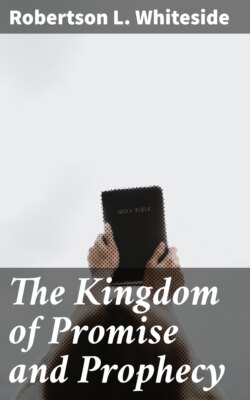Читать книгу The Kingdom of Promise and Prophecy - Robertson L. Whiteside - Страница 10
На сайте Литреса книга снята с продажи.
PROMISE TO ABRAHAM: GEN. 13:14, 15 AND ACTS 7:5
ОглавлениеTable of Contents
Since Abraham bought even a burying place for Sarah, and Stephen, in Acts 7:5, says, “He (God) gave him none inheritance in it, no, not so much as to set his foot on,” in what sense, if any, did he receive the promise contained in Gen. 13:14, 15?—Mrs. Mary B. Robins.
Personally, Abraham did not receive actual title to the land of promise, though the Lord, in some sense, did give him the land, as will be seen by reading Gen. 28:4; 35:12. He enjoyed its productiveness as fully as if he had been its actual owner. His vast herds fattened on its grass and drank water from the wells which his servants digged. Had God driven out all the nations and turned the land over to Abraham, he could not have possessed it nor have made any more use of it than he did. Stephen certainly did not mean to say that God had failed in his promise to Abraham. It seems that Stephen’s point was that the promise was not to Abraham as an individual, but to him as the founder of a nation—to his seed. The time for the promise to be fulfilled would come when Abraham’s posterity became sufficiently numerous to possess the land. That was clearly Stephen’s point, for he adds: “But as the time of the promise drew nigh which God vouchsafed unto Abraham, the people grew and multiplied in Egypt.” (Acts 7:17.) This shows that the time for the fulfillment of that promise was when the people grew and multiplied, and that the time for its fulfillment was not in Abraham’s day, nor is it yet in the future. It was fulfilled when the nations were driven out of Canaan and the land divided between the tribes of Israel. “So Jehovah gave unto Israel all the land which he sware to give unto their fathers; and they possessed it, and dwelt therein.... There failed not aught of any good thing which Jehovah had spoken unto the house of Israel.” (Josh. 21:43, 45.)
Yet in the face of all this, it has been argued that the land promise to Abraham must yet be fulfilled, and that Abraham must be raised and the Jews restored to Palestine in order for this promise to be fulfilled. But the argument is mixed. It starts out to prove that the land must be given to Abraham, and winds up with his sharing it with the Jews. But Stephen’s language destroys that conclusion, for his language shows plainly that Abraham and his seed were not to possess it jointly at the same time. Notice the language: “He promised that he would give to him in possession, and to his seed after him.” Not with him, but “after him.” The future-kingdom folks will have a hard time showing how Abraham will possess the land of Canaan during a millennium and then his seed possess it after him.
